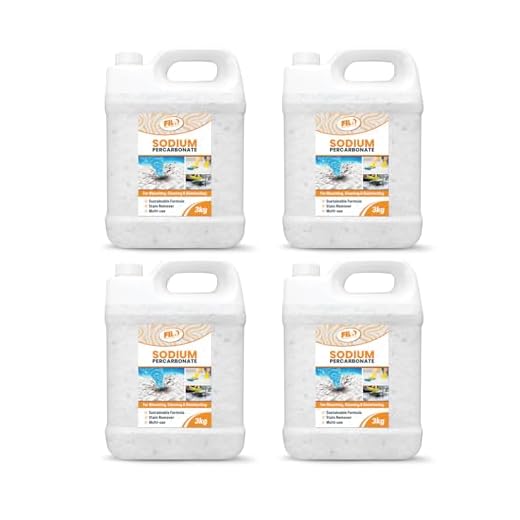




If you’ve ever spilled something on your clothes and ended up with pesky white stains, you’re not alone. White stains can be a real hassle to deal with, especially if you’re not sure how to remove them. Thankfully, there are proven solutions that can help you get rid of those stubborn white stains and restore your clothes to their original condition.
1. Vinegar: One of the most effective solutions for removing white stains from clothes is vinegar. Simply apply a small amount of white vinegar to the stain and gently rub it in. Let the vinegar sit on the stain for a few minutes, then rinse with cold water. Repeat this process until the stain is gone. Vinegar works well on a variety of fabrics, but be sure to test it on an inconspicuous area first to avoid any potential damage.
2. Baking Soda: Another tried and true solution for getting rid of white stains is baking soda. Make a paste by mixing baking soda with enough water to form a thick consistency. Apply the paste to the stain and let it sit for at least 30 minutes. Gently scrub the stain with a soft-bristle brush, then rinse with cold water. Baking soda is safe to use on most fabrics, but always test it on a small area first.
3. Lemon Juice: The natural acidity of lemon juice can also be an effective stain remover. Squeeze fresh lemon juice onto the stain and let it sit for a few minutes. Rub the stain gently with a cloth or sponge, then rinse with cold water. Lemon juice works well on white stains caused by mineral deposits or substances like coffee or tea. However, it’s important to avoid using lemon juice on delicate fabrics, as it can cause discoloration.
Remember, it’s always best to treat white stains as soon as possible to increase your chances of removing them completely. If one method doesn’t work, try another until you find the solution that works best for your specific stain and fabric type.
By following these proven solutions, you can say goodbye to white stains on your clothes and keep your wardrobe looking fresh and clean. So the next time a spill happens, don’t panic – you’ve got the tools to tackle those white stains head-on!
Effective Ways to Eliminate White Stains from Your Clothing
White stains on clothing can be frustrating and unsightly. Whether it’s caused by deodorant residue, bleach, or other substances, getting rid of these stains can seem like a challenge. However, with the right methods and products, you can effectively eliminate white stains from your clothing. Here are some proven solutions:
1. Vinegar
Vinegar is a versatile household item that can help remove white stains from your clothes. Mix equal parts white vinegar and water and soak the stained area in this solution for about 15 minutes. Then, gently scrub the stain with a soft-bristled brush or a sponge. Rinse the garment with water and wash it as usual.
2. Baking Soda
Baking soda is known for its stain-removing properties. Create a paste by mixing baking soda with a little water. Apply the paste to the white stain and let it sit for about 30 minutes. Use a soft cloth or brush to gently scrub the stain. Rinse the garment with water and wash it as usual.
3. Lemon Juice
Lemon juice contains natural bleaching properties that can help remove white stains. Squeeze fresh lemon juice onto the stain and let it sit for about 10 minutes. Then, rinse the garment with water and wash it as usual.
4. Dishwashing Detergent
Dishwashing detergent can be effective in removing white stains. Create a mixture by combining one part dishwashing detergent with two parts warm water. Gently dab the mixture onto the stain using a clean cloth or sponge. Let it sit for a few minutes, then rinse the garment with water and wash it as usual.
5. Stain Remover Products
If the previous methods do not fully remove the white stains, you can try using a stain remover product specifically designed for clothing. Follow the instructions on the product packaging for best results.
6. Prevention Tips
Preventing white stains is always better than having to remove them. Here are some tips to help prevent white stains on your clothing:
- Avoid applying lotions or creams directly onto your clothes as they can leave residue.
- Wait for deodorant or antiperspirant to dry completely before getting dressed to prevent transfer onto clothing.
- Read the care labels on your clothing and follow the washing instructions to avoid damage or stains.
Remember, it’s important to always check the care labels and test any stain removal method on a small, inconspicuous area of the garment before applying it to the stain. This will help prevent any further damage or discoloration.
By following these effective methods and prevention tips, you can successfully eliminate white stains from your clothing and keep them looking fresh and stain-free.
Natural Remedies for Removing White Stains
White stains on clothes can be frustrating, but before you reach for harsh chemicals, consider trying these natural remedies:
1. Lemon Juice
Lemon juice is a natural bleaching agent that can help remove white stains from clothes. Simply squeeze fresh lemon juice onto the stained area and let it sit for a few minutes. Then, rinse the clothing with cold water and wash as usual.
2. Baking Soda
Baking soda is another effective natural remedy for white stains. Create a paste by mixing baking soda with a little water. Apply the paste to the stained area and gently scrub with a soft brush or cloth. Rinse with cold water and wash as usual.
3. Vinegar
Vinegar is a versatile household ingredient that can also be used to remove white stains. Mix equal parts vinegar and water, and apply the solution to the stained area. Let it sit for a few minutes, then rinse with cold water and wash as usual.
4. Salt
Salt can help absorb moisture and remove white stains from clothes. Sprinkle salt directly onto the stained area and let it sit for a few minutes. Gently rub the salt into the stain, then rinse with cold water and wash as usual.
5. Hydrogen Peroxide
Hydrogen peroxide is a powerful stain remover that can help eliminate white stains. Apply a small amount of hydrogen peroxide to the stained area and let it sit for a few minutes. Rinse with cold water and wash as usual. Note: Test hydrogen peroxide on a small, inconspicuous area of the fabric first to check for any adverse reactions.
These natural remedies can be effective in removing white stains from clothes. However, it’s important to always check the care label on your clothing and test any cleaning solution on a small, inconspicuous area first before treating the stain.
Quick Tips for Banishing White Stains from Different Types of Fabric
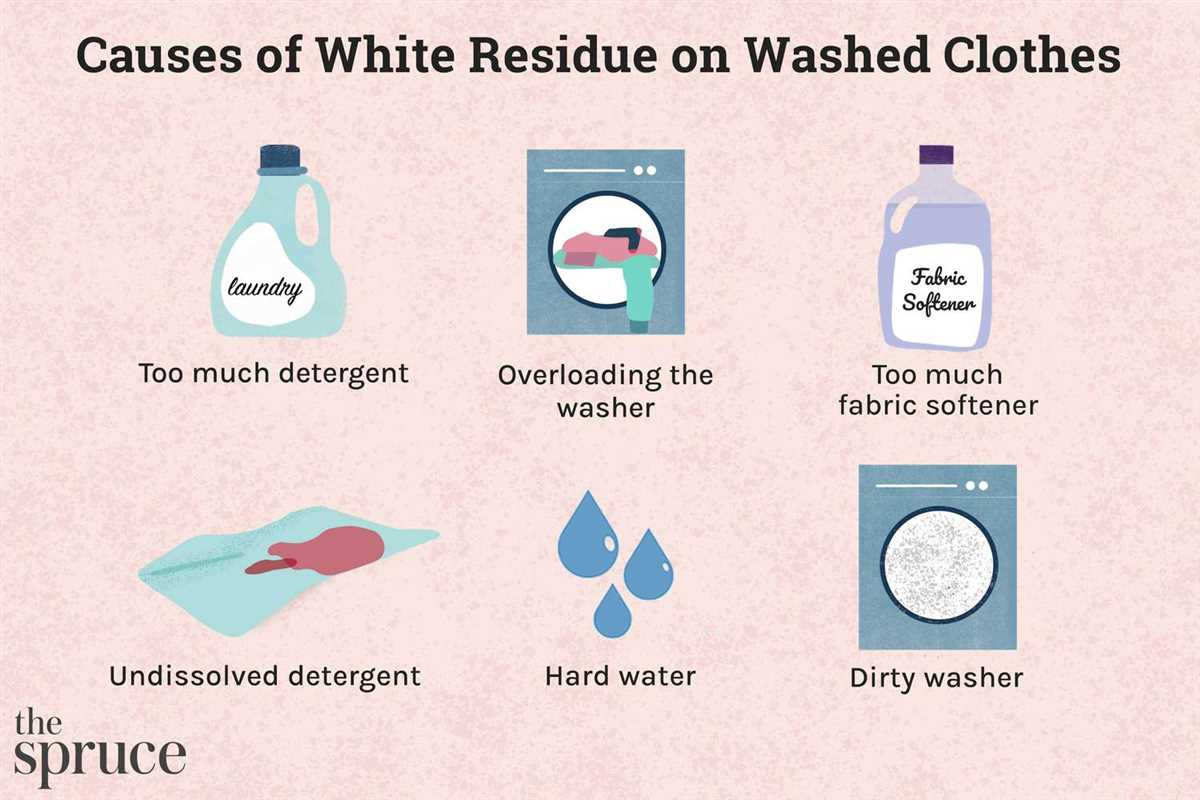
Cotton and Polyester
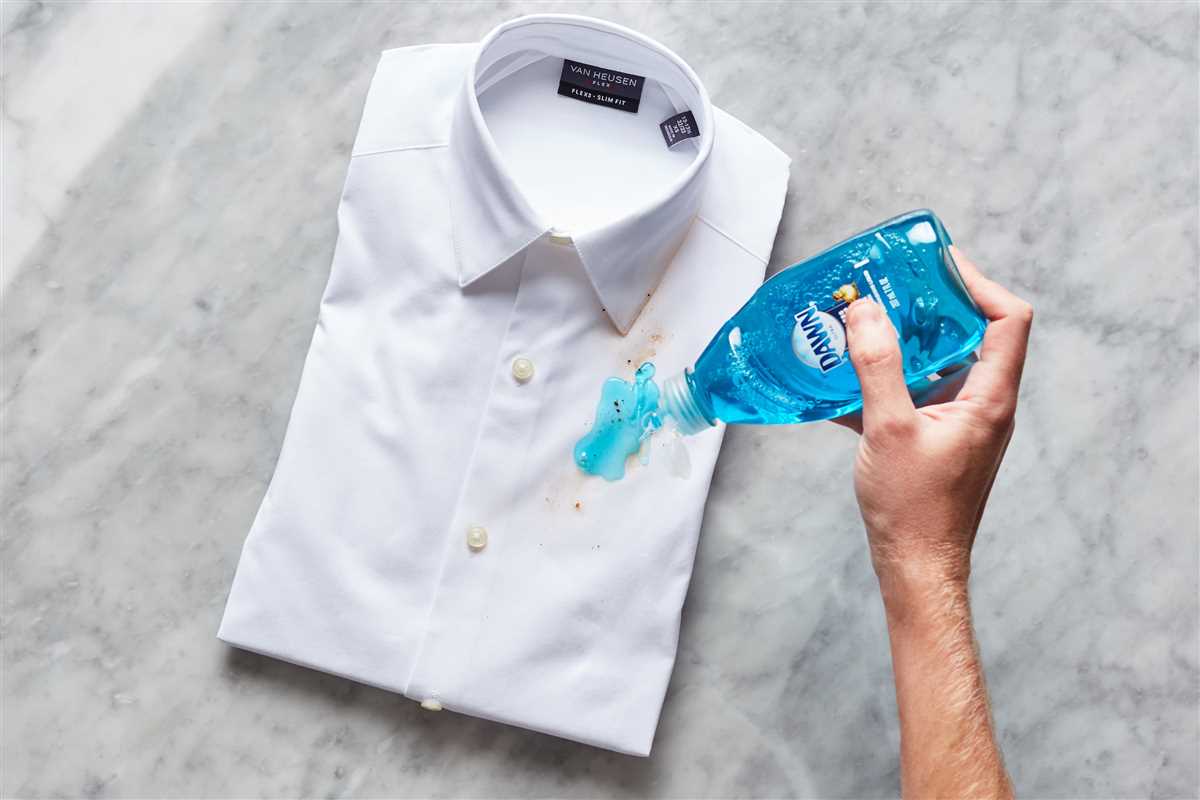
Cotton and polyester are commonly used fabrics, and they can both be prone to white stains. Here are some quick tips for removing white stains from these fabric types:
- Dampen the stained area with water.
- Apply a small amount of mild detergent directly to the stain.
- Gently rub the fabric together to create a lather.
- Rinse the area thoroughly with water.
- If the stain persists, repeat the process or try using a stain remover designed specifically for these fabrics.
Silk
Silk is a delicate fabric that requires extra care when treating white stains. Here’s what you can do:
- Gently blot the stained area with a clean, white cloth to absorb as much of the stain as possible.
- Avoid rubbing the fabric, as it can damage the delicate fibers.
- Mix a solution of lukewarm water and gentle, pH-neutral soap.
- Dip a soft cloth or sponge into the solution and gently blot the stain.
- Rinse the area thoroughly with lukewarm water, being careful not to oversaturate the fabric.
- If the stain remains, take the garment to a professional dry cleaner with experience in handling silk.
Wool
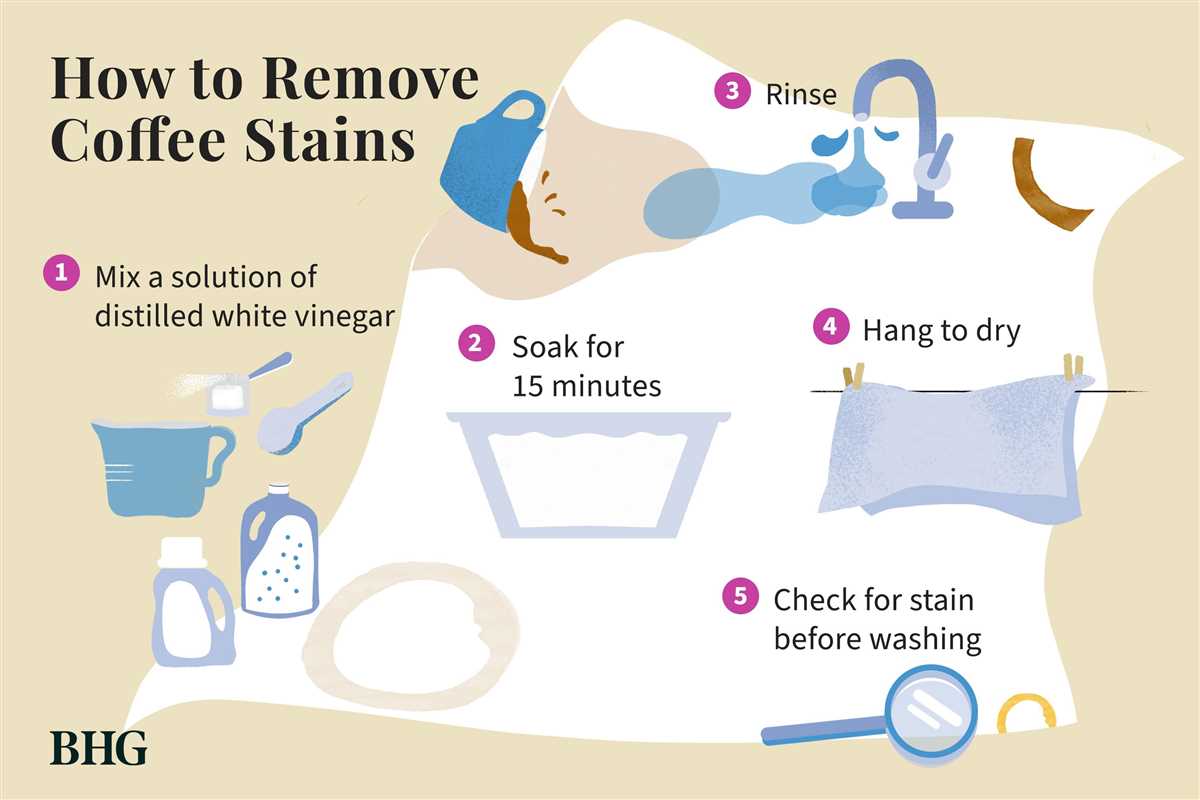
Wool is another delicate fabric that requires special care when removing white stains. Follow these tips:
- Blot the stained area with a clean cloth to remove any excess liquid.
- Avoid using hot water or rubbing the stain vigorously, as it can cause the wool fibers to shrink or felt.
- Pour a small amount of cold water onto the stain and gently blot it with a clean cloth.
- If the stain persists, mix a solution of cold water and mild detergent.
- Gently blot the stain with the solution, taking care not to oversaturate the fabric.
- Rinse the area thoroughly with cold water and blot it dry.
- Consider taking the garment to a professional cleaner if the stain is stubborn or if you’re unsure about treating it yourself.
Nylon and Synthetic Fabrics
Nylon and other synthetic fabrics are known for their stain-resistant properties, but they can still develop white stains. Try these methods to remove them:
- Blot the stained area with a clean cloth to remove any excess liquid.
- Mix a solution of warm water and mild detergent.
- Gently blot the stain with the solution using a clean cloth or sponge.
- Rinse the area thoroughly with water.
- If the stain persists, try using a stain remover specifically designed for synthetic fabrics.
Remember to always check the care label of your garment and follow any specific instructions provided by the manufacturer. If you’re unsure about removing white stains yourself, it’s best to seek professional cleaning assistance.
Professional Stain Removal Techniques to Get Rid of White Stains
White stains on clothes can be stubborn and difficult to remove. However, professional stain removal techniques can help you effectively get rid of these pesky marks and restore your clothes to their original condition. Here are some proven solutions:
- Lemon Juice: Lemon juice is a natural bleaching agent that can help remove white stains. Squeeze fresh lemon juice onto the stain and let it sit for a few minutes. Rinse the garment with cold water and wash it as usual.
- Vinegar: Vinegar is another effective stain remover for white stains. Mix equal parts of vinegar and water and apply the solution to the stain. Gently rub the fabric together to help loosen the stain. Rinse with cold water and wash the garment as usual.
- Baking Soda: Baking soda is a versatile cleaning agent that can also remove white stains. Make a paste by mixing baking soda with water and apply it to the stain. Let it sit for a few minutes before rinsing with cold water and washing the garment.
- Hydrogen Peroxide: Hydrogen peroxide is a powerful stain remover that can effectively eliminate white stains. Dampen the stained area with hydrogen peroxide and let it sit for a few minutes. Rinse with cold water and wash the garment as usual.
Note: It’s always important to spot test any stain removal solution on a small, inconspicuous area of the garment before applying it to the stain. This will help ensure that the solution doesn’t damage or discolor the fabric.
If the above techniques don’t completely remove the white stains, it may be helpful to consult a professional dry cleaner. They have access to specialized cleaning agents and equipment that can effectively remove tough stains.
Remember to always read and follow the care instructions on your clothing labels. Some delicate fabrics may require special attention and should be taken to a professional cleaner for stain removal.
By using these professional stain removal techniques, you can effectively get rid of white stains and restore your clothes to their original, stain-free condition.
Preventive Measures to Avoid White Stains on Your Clothes
1. Use an Appropriate Amount of Detergent
One common cause of white stains on clothes is using too much detergent. When using a washing machine, it’s important to follow the recommended dosage on the detergent packaging. Overusing detergent can leave residue on clothes, resulting in white stains.
2. Avoid Fabric Softener Buildup
Fabric softeners are known to leave white stains on clothes when they build up over time. To prevent this, consider using a liquid fabric softener instead of dryer sheets. Additionally, make sure to follow the recommended dosage for fabric softener and clean the washing machine’s dispenser regularly to avoid any buildup.
3. Check for Hard Water Issues
Hard water can cause mineral deposits to build up on clothes, leading to white stains. If you suspect hard water is the issue, consider using a water softener or adding a water conditioner to your laundry routine. These products can help prevent mineral buildup and keep your clothes stain-free.
4. Avoid Excessive Bleach
Bleach is a powerful stain remover, but it can also cause white stains if used improperly. To avoid this, make sure to follow the instructions on the bleach bottle and never use more than the recommended amount. Additionally, be cautious when using bleach on colored or delicate fabrics.
5. Rinse Clothes Thoroughly
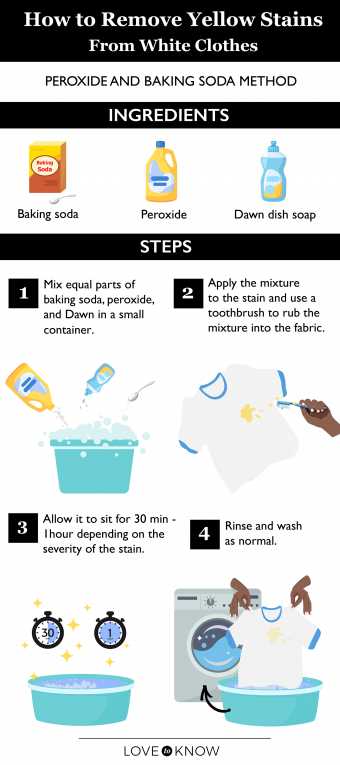
Residual detergent and fabric softener can cause white stains on clothes if they aren’t rinsed out properly. Take the time to ensure that your clothes are thoroughly rinsed during the washing cycle. This can help remove any leftover product and prevent white stains from forming.
6. Avoid Direct Contact with Harsh Chemicals
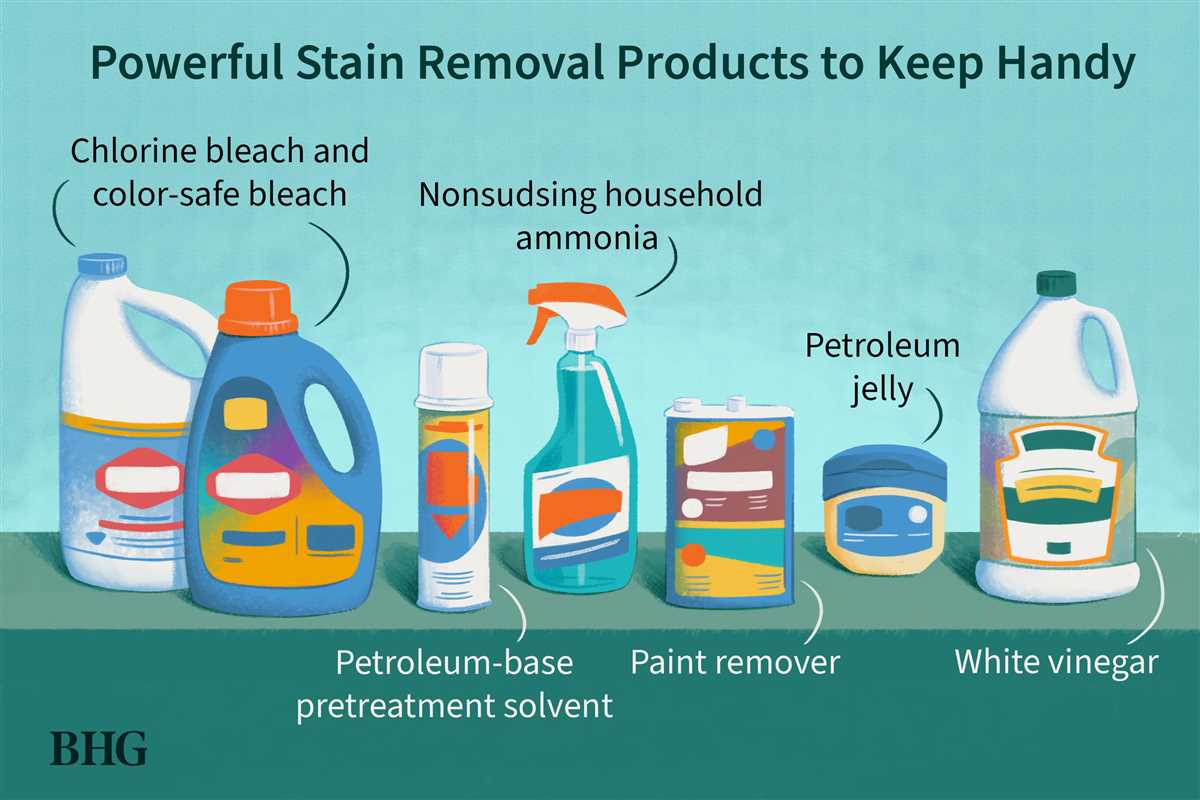
Harsh chemicals, such as cleaning products or chlorine, can cause white stains on clothes if they come into direct contact. When working with these substances, make sure to wear appropriate protective clothing and wash your hands properly before handling your clothes.
7. Choose the Right Laundry Products
Some laundry products are specifically designed to prevent white stains on clothes. Look for products labeled as “stain-free” or “stain prevention” to ensure that you’re using the most suitable options for maintaining the appearance of your clothes.
8. Inspect Your Washing Machine
A malfunctioning washing machine can cause white stains on clothes due to various issues, such as excess detergent buildup or poor rinsing. Regularly inspect your washing machine for any signs of damage or leaks, and address any issues promptly to prevent them from affecting your clothes.
- Use an appropriate amount of detergent
- Avoid fabric softener buildup
- Check for hard water issues
- Avoid excessive bleach
- Rinse clothes thoroughly
- Avoid direct contact with harsh chemicals
- Choose the right laundry products
- Inspect your washing machine
Frequently Asked Questions about Dealing with White Stains
1. What causes white stains on clothes?
White stains on clothes can be caused by a variety of factors, including:
- Residue from laundry detergent
- Deodorant or antiperspirant stains
- Mineral deposits from hard water
- Bleach spills
- Mold or mildew
- Chemical reactions with other substances
2. How can I prevent white stains on my clothes?
To prevent white stains on clothes, consider the following tips:
- Use less detergent and make sure it is fully dissolved before adding clothes
- Avoid using too much deodorant or antiperspirant
- Use a water softener if you have hard water
- Be careful when using bleach and follow the instructions on the label
- Ensure your clothes are fully dry before storing them to prevent mold and mildew
3. How do I remove white stains caused by detergent residue?
To remove white stains caused by detergent residue, try the following steps:
- Wet the stained area with water
- Gently rub a mixture of white vinegar and water onto the stain
- Rinse the area with water
- Wash the garment as usual
4. What should I do if I get bleach on my clothes?
If you get bleach on your clothes, act quickly:
- Rinse the stained area immediately with cold water
- Apply a mixture of water and ammonia to the stain
- Let it sit for a few minutes
- Rinse the area with cold water
- Wash the garment as usual, but do not use bleach in the wash
5. Can white stains caused by mold or mildew be removed?
Yes, white stains caused by mold or mildew can usually be removed. Try the following steps:
- Brush off any visible mold or mildew with a soft brush
- Mix a solution of equal parts vinegar and water
- Apply the solution to the stain and let it sit for 15-30 minutes
- Rinse the area with water
- Wash the garment as usual
If the stain persists, you may need to repeat the process or consider using a stain remover specifically designed for mold and mildew.
6. Are there any other solutions to remove white stains?
Yes, there are other solutions to remove white stains from clothes. Some options include:
- Using a stain remover or pre-treatment product
- Trying a paste made of baking soda and water
- Using hydrogen peroxide or lemon juice on the stain
- Consulting a professional cleaner for stubborn stains
7. Can I prevent white stains by using natural laundry detergents?
Using natural laundry detergents can help prevent residue stains, as they typically have fewer additives and chemicals. However, it’s important to follow the instructions on the detergent packaging and adjust the amount used based on your water hardness and load size.
8. How do I deal with white stains on delicate fabrics?
When dealing with white stains on delicate fabrics, it is important to be gentle:
- Blot the stain with a clean cloth to remove any excess residue
- Dab a small amount of mild detergent onto the stained area
- Gently rub the fabric together to work the detergent into the stain
- Rinse the fabric with cold water
- Place the garment in a mesh laundry bag
- Wash it on a gentle cycle with cold water
9. Can white stains be prevented when using bleach?
When using bleach, it can be difficult to prevent white stains entirely. However, you can minimize the risk by following these tips:
- Make sure to dilute the bleach properly according to the instructions
- Avoid pouring undiluted bleach directly onto clothes
- Rinse clothes thoroughly after using bleach
- Consider using a bleach alternative or bleach pen for targeted stain removal
10. How can I prevent white stains from deodorant or antiperspirant?
To prevent white stains from deodorant or antiperspirant, try the following tips:
- Apply deodorant or antiperspirant to completely dry skin
- Allow it to dry before putting on clothes
- Consider using clear or gel formulations, as they are less likely to leave white residue
- Wash clothes regularly, as residue can build up over time
FAQ
What causes white stains on clothes?
White stains on clothes can be caused by various factors, such as residue from detergent or fabric softener, sweat, deodorant, or even hard water deposits. These substances can leave behind white marks on clothes, especially if they are not properly rinsed or washed.
How can I remove white stains from clothes?
To remove white stains from clothes, you can try several proven solutions. One option is to soak the stained garment in a mixture of warm water and vinegar, then wash it as usual. Another solution is to create a paste with baking soda and water, apply it to the stain, and let it sit for a while before washing. Additionally, using a stain remover or pre-treating the stain with a laundry detergent can also help remove white stains from clothes.
Will these solutions work on all types of fabrics?
The solutions mentioned above are generally effective on most types of fabrics. However, it is always advisable to check the care label on the garment before attempting any stain removal method. Some delicate fabrics may require special treatment or professional cleaning to avoid damaging the fabric or causing discoloration.
What if the white stains don’t come out after trying these methods?
If the white stains persist after trying the recommended methods, it may be helpful to consult a professional cleaner. They will have the expertise and specialized products to tackle stubborn stains without damaging the fabric. It’s also possible that the stains may be permanent, especially if they have set in for a long time or are caused by bleach or other harsh chemicals.


